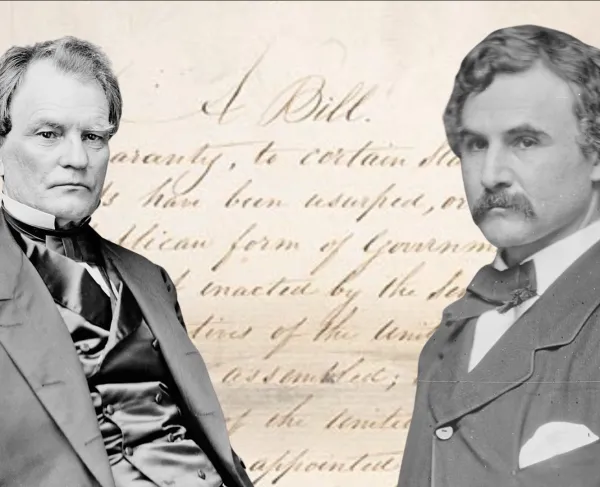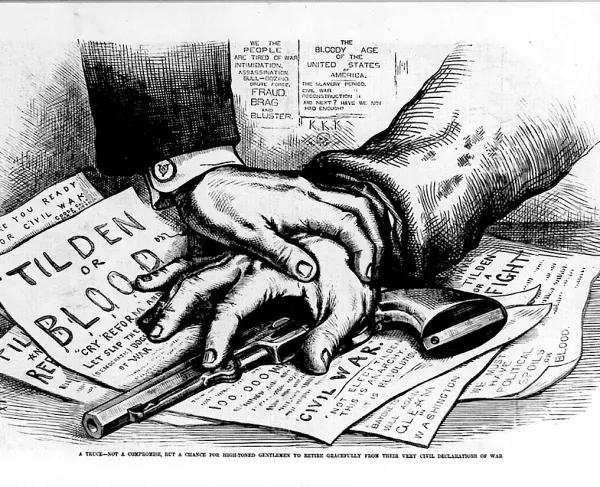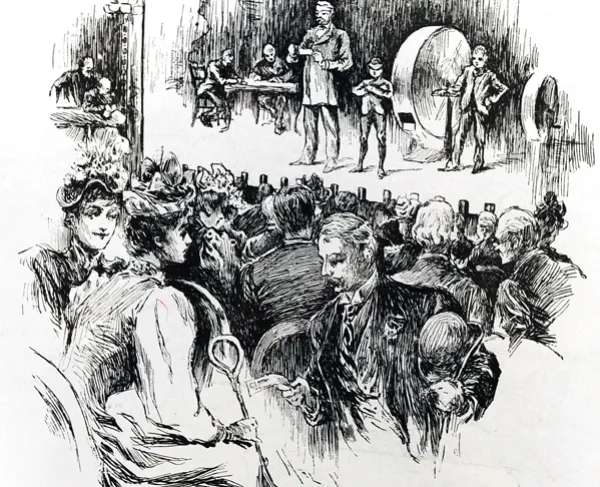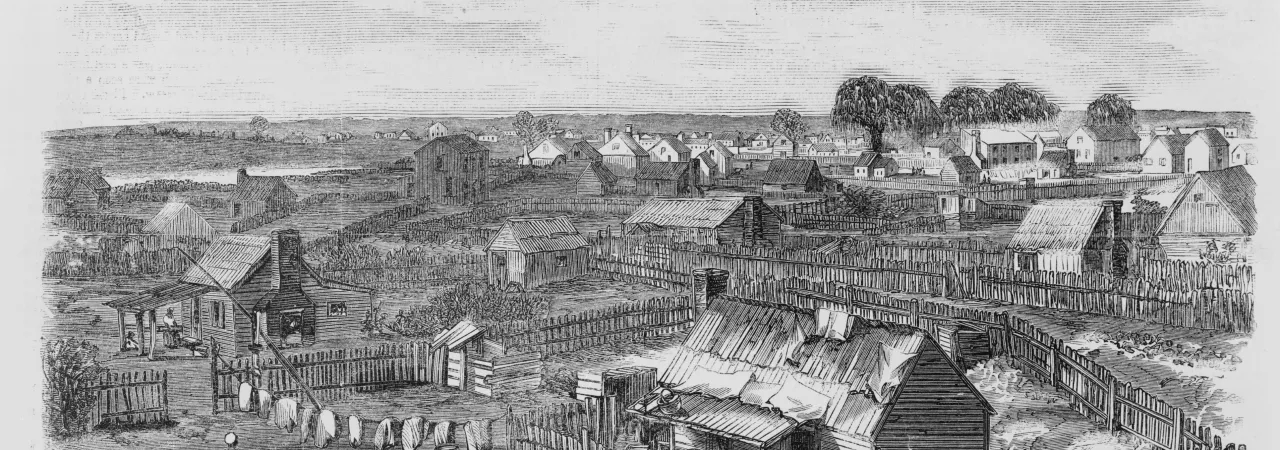
The Emancipation Proclamation took effect on January 1, 1863, granting freedom to all enslaved people within rebelling territories. In January 1865, General William T. Sherman issued Special Field Orders No. 15, reserving confiscated land on the coast of Georgia and South Carolina for the use of freedpeople, each family to be given 40 acres, which was the source for the expression “forty acres and a mule.” The same month, the Thirteenth Amendment was passed by Congress, officially abolishing the institution of slavery in the United States. President Abraham Lincoln had hinted towards granting suffrage to black males. As clean cut as this sounds, the situation for formerly enslaved people on the ground was much more complicated. Their lives had been changed dramatically in a short amount of time, and some of them had nothing but the clothes on their back. While initially celebrating emancipation and the end of the war, many freedpeople were now wondering, “Now what?”

In March 1865, the Bureau of Refugees, Freedmen, and Abandoned Lands, or the Freedmen’s Bureau, was established to assist these newly freed people. The bureau helped African Americans find family members from whom they were separated during the war, gave them necessary food and medical aid, established schools throughout the South, and helped them secure fair employment. However, its efficacy was soon under attack by Southern state governments.
Lincoln was assassinated on April 15, and now the task of Reconstruction fell to his vice president—now president—Andrew Johnson. However, Johnson had a very different vision of what Reconstruction should look like than his predecessor. The Tennessee native favored leniency to former Confederates, granting them full amnesty, allowing them to once again become full citizens. Johnson also rescinded Sherman’s “forty acres and a mule” order, returning the land to its former owners, regardless of the blacks who had already settled there. Only whites could vote for delegates to and participate in the conventions, and they were often dominated by ex-Confederates who wanted to restore the status quo from before the war. As a result, blacks had no voice in their states’ governments. Because a condition of rejoining the Union was ratifying the Thirteenth Amendment, slavery in its former form could not be implemented. Instead, Southern governments began to write black codes to restrict the freedom of formerly enslaved people and guarantee the continuation of a cheap labor force. They were a perpetuation of antebellum slave codes, although they granted limited civil rights, such as being able to make contracts and marry.
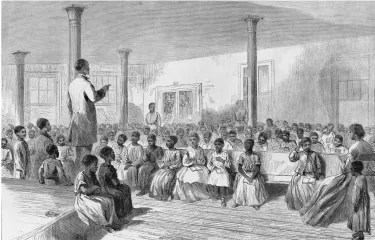
The most infamous of these black codes were from Mississippi and South Carolina, although nearly every Southern state enacted some sort of black code. Mississippi propagated slavery in a different form by forcing blacks to have written evidence of employment at the start of each year. If they failed to do so, they could forfeit their wages or be arrested. South Carolina’s black code prohibited blacks from having an occupation outside of agriculture or domestic work unless they paid an annual tax, which hit urban blacks especially hard. Punishments in both these states also included “hiring out” the perpetrator to do free labor.
Northerners were enraged by what they saw as Southerners completely ignoring the results of the war. As a result, Congress passed the Civil Rights Act of 1866, a bill that had been introduced in 1865 but was vetoed by Johnson. He vetoed it again in 1866, but this time, both chambers overrode the veto – the first time Congress ever overrode the president’s veto of major legislation. The act was intended to protect the civil rights of blacks, which were being trampled upon by Southern state governments. But some in Congress believed that Congress didn’t have the power to enact the legislation. Thus, it wasn’t until 1868 when the Fourteenth Amendment was passed that the Civil Rights Act became law.
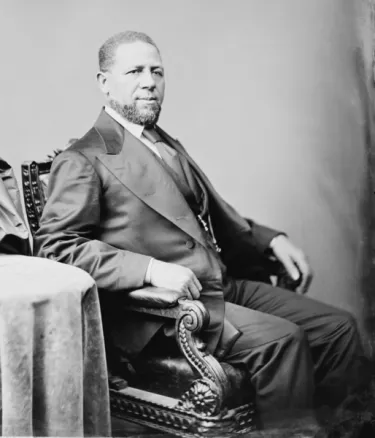
Elections of 1866 were a reaction against Johnson’s lenient Reconstruction, allowing Radical Republicans to dominate Congress. Thus, in 1867, Reconstruction began a new stage as it passed from the president to Congress. Johnson had been effectively neutralized by his impeachment trial, so Congress took over Reconstruction. They instituted much stricter measures than Johnson had, sending in the military to ensure the Southern states cooperated with the federal government.
The Fourteenth Amendment effectively killed the black codes, declaring all who were born in the U.S. were citizens and were subject to equal protection under the law. It was directly aimed at combating the black codes and was initially successful in doing so. The Southern legislatures were dissolved until they wrote their constitutions for a second time. The Fifteenth Amendment then granted universal suffrage – and for the first time, blacks were elected to office in the South. Both the military and the Freedmen’s Bureau set to work making sure these measures were enforced.
For a time, it seemed as if this new status quo of equality for all would persist in the South. Blacks had a large role in rewriting state constitutions and participated in public life in unprecedented numbers. The Ku Klux Klan, after its initial reign of terror in 1867-69, was essentially destroyed by Ulysses S. Grant, his newly created Department of Justice, and the U.S. army.
However, Northern support for Reconstruction waned, and after the election of President Rutherford B. Hayes, Reconstruction was at an end as the military withdrew and once again left the South to its own devices. The coming years would see the emergence of Jim Crow laws, which sought to undermine African Americans’ voting and civil rights as another perpetuation of the black codes.
Further Reading
- Unjustifiably Oppressed: Black Codes of Mississippi (1865) By: Dr. Roderick Van Daniel
- Inhuman Bondage: The Rise and Fall of Slavery in the New World By: David Brion Davis
- The Dred Scott Case: Its Significance in American Law and Politics By: Don E. Fehrenbacher
- Dred Scott v. Sandford: A Brief History with Documents By: Paul Finkelman
- The Second Founding: How the Civil War and Reconstruction Remade the Constitution By: Eric Foner
- The Black Codes: 1865-1867 By: Byne Francis Goodman
- Battle Cry of Freedom: The Civil War Era By: James M. McPherson
- The Oxford Handbook of Slavery in the Americas By: Robert L. Paquette and Mark M. Smith
- Before Dred Scott: Slavery and Legal Culture in the American Confluence, 1787–1857 By: Anne Twitty
